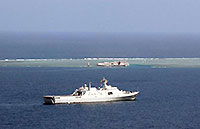Abe returns as Japan's leader
By ZHANG YUNBI (China Daily) Updated: 2012-12-27 00:04Beijing on Wednesday called on the new administration to make tangible efforts to "overcome difficulties in bilateral ties" and get relations back on track.
The two neighbors witnessed a sharp standoff after Japan's illegal "purchase" of China's Diaoyu Islands in September.
"Healthy, stable China-Japan ties serve the core interests of both countries and their peoples," said Hua Chunying, Foreign Ministry spokeswoman.
Although the LDP administration needs to heal the "wound" left by the ousted DPJ Cabinet, Gao said Abe's proposals for warming neighborly ties do not run against Tokyo's basic diplomatic goal ― enhancing the US-Japan alliance.
Abe will make his maiden visit abroad to the United States in January.
Feng Wei, an expert on Japanese studies at Fudan University in Shanghai, said the new Cabinet "has shown strong preference" on deepening the US-Japan alliance and listed it as its top diplomatic and defense priority.
Abe's planned Washington visit signals that Japan is ready to end its wavering attitude toward the US-Japan alliance, said Yuan Peng, an expert on US studies at the China Institutes of Contemporary International Relations.
In the past few years, the DPJ Cabinet has been blasted for trying to drift away from Tokyo's strategic dependence on Washington.
"Both allies have their own pursuits in deepening the alliance, as Washington expects Tokyo to continue to serve as the leading force of Washington's pivot to Asia, while Tokyo seeks to regain the regional balance of power," Yuan said.
Special coverage:
China-Japan Diaoyu Island Dispute
- China expects Japan to restore normal relations
- Abe becomes Japan's new prime minister
- Japan's new cabinet to aim at overcoming deflation
- Japan's Abe to pick MP Kishida as FM
- Diplomat warns Sino-Japan ties may sink like Titanic
- Poll shows strains in China-Japan-S Korea ties
- Abe's visit to shrine to further dent China-Japan ties
- China-Japan relations stalled by islands dispute







